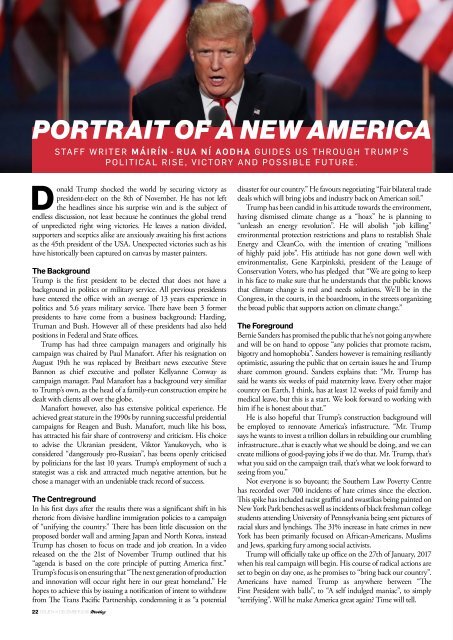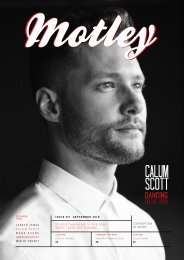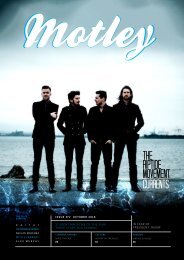Create successful ePaper yourself
Turn your PDF publications into a flip-book with our unique Google optimized e-Paper software.
Letter to the Editor<br />
PORTRAIT OF A NEW AMERICA<br />
STAFF WRITER MÁIRÍN - RUA NÍ AODHA GUIDES US THROUGH TRUMP’S<br />
POLITICAL RISE, VICTORY AND POSSIBLE FUTURE.<br />
Operation Sophia: A Military<br />
Solution to a Humanitarian<br />
Problem<br />
IN RESPONSE TO MOTLEY’S<br />
NOVEMBER ISSUE, GARY<br />
MOLONEY DISCUSSES<br />
THE ONGOING MARITIME<br />
SECURITY MISSION IN THE<br />
MEDITERRANEAN.<br />
Donald Trump shocked the world by securing victory as<br />
president-elect on the 8th of November. He has not left<br />
the headlines since his surprise win and is the subject of<br />
endless discussion, not least because he continues the global trend<br />
of unpredicted right wing victories. He leaves a nation divided,<br />
supporters and sceptics alike are anxiously awaiting his first actions<br />
as the 45th president of the USA. Unexpected victories such as his<br />
have historically been captured on canvas by master painters.<br />
The Background<br />
Trump is the first president to be elected that does not have a<br />
background in politics or military service. All previous presidents<br />
have entered the office with an average of 13 years experience in<br />
politics and 5.6 years military service. There have been 3 former<br />
presidents to have come from a business background; Harding,<br />
Truman and Bush. However all of these presidents had also held<br />
positions in Federal and State offices.<br />
Trump has had three campaign managers and originally his<br />
campaign was chaired by Paul Manafort. After his resignation on<br />
August 19th he was replaced by Breitbart news executive Steve<br />
Bannon as chief executive and pollster Kellyanne Conway as<br />
campaign manager. Paul Manafort has a background very similiar<br />
to Trump’s own, as the head of a family-run construction empire he<br />
dealt with clients all over the globe.<br />
Manafort however, also has extensive political experience. He<br />
achieved great stature in the 1990s by running successful preidential<br />
campaigns for Reagen and Bush. Manafort, much like his boss,<br />
has attracted his fair share of controversy and criticism. His choice<br />
to advise the Ukranian president, Viktor Yanukovych, who is<br />
considered “dangerously pro-Russian”, has beens openly criticised<br />
by politicians for the last 10 years. Trump’s employment of such a<br />
stategist was a risk and attracted much negative attention, but he<br />
chose a manager with an undeniable track record of success.<br />
The Centreground<br />
In his first days after the results there was a significant shift in his<br />
rhetoric from divisive hardline immigration policies to a campaign<br />
of “unifying the country.” There has been little discussion on the<br />
proposed border wall and arming Japan and North Korea, instead<br />
Trump has chosen to focus on trade and job creation. In a video<br />
released on the the 21st of November Trump outlined that his<br />
“agenda is based on the core principle of putting America first.”<br />
Trump’s focus is on ensuring that “The next generation of production<br />
and innovation will occur right here in our great homeland.” He<br />
hopes to achieve this by issuing a notification of intent to withdraw<br />
from The Trans Pacific Partnership, condemning it as “a potential<br />
disaster for our country.” He favours negotiating “Fair bilateral trade<br />
deals which will bring jobs and industry back on American soil.”<br />
Trump has been candid in his attitude towards the environment,<br />
having dismissed climate change as a “hoax” he is planning to<br />
“unleash an energy revolution”. He will abolish “job killing”<br />
environmental protection restrictions and plans to restablish Shale<br />
Energy and CleanCo, with the intention of creating “millions<br />
of highly paid jobs”. His attitiude has not gone down well with<br />
environmentalist, Gene Karpinkski, president of the Leauge of<br />
Conservation Voters, who has pledged that “We are going to keep<br />
in his face to make sure that he understands that the public knows<br />
that climate change is real and needs solutions. We’ll be in the<br />
Congress, in the courts, in the boardroom, in the streets organizing<br />
the broad public that supports action on climate change.”<br />
The Foreground<br />
Bernie Sanders has promised the public that he’s not going anywhere<br />
and will be on hand to oppose “any policies that promote racism,<br />
bigotry and homophobia”. Sanders however is remaining resiliantly<br />
optimistic, assuring the public that on certain issues he and Trump<br />
share common ground. Sanders explains that: “Mr. Trump has<br />
said he wants six weeks of paid maternity leave. Every other major<br />
country on Earth, I think, has at least 12 weeks of paid family and<br />
medical leave, but this is a start. We look forward to working with<br />
him if he is honest about that.”<br />
He is also hopeful that Trump’s construction background will<br />
be employed to rennovate America’s infastructure. “Mr. Trump<br />
says he wants to invest a trillion dollars in rebuilding our crumbling<br />
infrastructure...that is exactly what we should be doing, and we can<br />
create millions of good-paying jobs if we do that. Mr. Trump, that’s<br />
what you said on the campaign trail, that’s what we look forward to<br />
seeing from you.”<br />
Not everyone is so buyoant; the Southern Law Poverty Centre<br />
has recorded over 700 incidents of hate crimes since the election.<br />
This spike has included racist graffiti and swastikas being painted on<br />
New York Park benches as well as incidents of black freshman college<br />
students attending University of Pennsylvania being sent pictures of<br />
racial slurs and lynchings. The 31% increase in hate crimes in new<br />
York has been primarily focused on African-Americans, Muslims<br />
and Jews, sparking fury among social activists.<br />
Trump will officially take up office on the 27th of January, 2017<br />
when his real campaign will begin. His course of radical actions are<br />
set to begin on day one, as he promises to “bring back our country”.<br />
Americans have named Trump as anywhere between “The<br />
First President with balls”, to “A self indulged maniac”, to simply<br />
“terrifying”. Will he make America great again? Time will tell.<br />
On the 3rd of September 2015, the world awoke<br />
to an image that would change how it perceived<br />
the migrant crisis in Europe. The lifeless body<br />
of a young Syrian child adorned the front pages<br />
of newspapers and magazines across the globe. His name was<br />
Aylan Kurdi and he was among the 3,771 migrants estimated to<br />
have died while attempting to cross the Mediterranean in 2015.<br />
Europe had, in the most tragic of fashions, seen the human cost<br />
of its migration policy.<br />
Much has been discussed at an academic and political level<br />
concerning the durability of the EU’s asylum system and its<br />
capacity to respond to the so-called crisis. Yet, an oft-forgotten,<br />
and woefully under-examined, element of the EU’s response is<br />
the maritime security mission; EUNAVFOR Med, or Operation<br />
Sophia as it is better known. Through this mission, the EU<br />
engages in the search, seizure and disposal of vessels being used<br />
by migrant smugglers in an attempt to stem the flow of migrants<br />
using the Central Mediterranean route to reach Europe.<br />
Rather than a traditional search and rescue mission, Operation<br />
Sophia instead opts to tackle the business model of migrant<br />
smuggling, through the interdiction of vessels on the high-seas.<br />
Indeed, although the EU recognises the need to prevent the<br />
loss of life as an immediate priority, it gave no explicit search<br />
and rescue mandate to the mission. Under the Law of the Sea,<br />
shipmasters have an obligation to render assistance to vessels in<br />
distress, but the lack of an explicit mandate is telling as to the<br />
lens with which the EU views the crisis as a whole.<br />
It is ironic then that Operation Sophia has engaged extensively<br />
in rescue missions during its life-time due to the unseaworthy<br />
nature of many vessels being used by migrant smugglers. This<br />
situation has been exacerbated by the increasingly riskier methods<br />
being used by smugglers. In many respects, Operation Sophia<br />
has become a search and rescue mission in everything but name.<br />
Perhaps, that was the EU’s intention all-along, knowing that the<br />
scepticism demonstrated towards its few pro-refugee policies by<br />
countries such as Hungary, Bulgaria and the UK. It may be a<br />
stretch to suggest the EU was engaged in a clever political game<br />
when it devised the parameters of Operation Sophia, even if it<br />
would be re-assuring to think so.<br />
The mandate of the mission itself may be questionable, but<br />
it has produced some positives in terms of search and rescue.<br />
However, that very success has prevented it from cracking the<br />
business model of smugglers. Following the destruction of many<br />
of their more expensive wooden vessels, smugglers switched to<br />
cheaper, less-seaworthy rubber models. The reasons for this are<br />
two-fold. Firstly, the destruction of these cheaper models doesn’t<br />
overly impact their bottom-line. Secondly, they engage in a<br />
form of “lawfare” where they manufacture search and rescue<br />
situations in order to trigger the legal and moral obligations of<br />
others. In doing so, they are only required to get migrants onto<br />
the high seas and in a position to raise a distress signal via a<br />
satellite phone. The duty to render assistance then compels other<br />
vessels, regardless of their status, to come to their aid.<br />
Another question worthy of consideration is the territorial<br />
limitations of the mission. While Operation Sophia is backed<br />
by a UN Security Council mandate, its actions are restricted to<br />
the high seas off the coast of Libya. It does not have a mandate<br />
to go into Libyan territorial waters and consequently, migrant<br />
smugglers can evade EU forces by remaining safely out of their<br />
reach. The end-goal of Operation Sophia requires that it have<br />
access to Libyan territorial waters, to be able to apprehend<br />
suspected smugglers earlier in the process, preferably before they<br />
launch. The internal squabbles of the Security Council, bolstered<br />
by Russia, still feeling the sting of the last Libyan intervention,<br />
make it unlikely that a mandate will manifest without the express<br />
consent of the fragile Libyan government.<br />
In recent months, Operation Sophia has begun to engage in<br />
an EU-led capacity building programme aimed at ensuring the<br />
Libyan navy is capable of effectively monitoring its own borders.<br />
It is hoped that this diplomatic partnership will form the basis<br />
for an invitation to work within Libyan territorial waters in the<br />
future. The success of this strategy will require a delicate balance<br />
that enables Libya to save face in the eyes of its critics and shakeoff<br />
the critique that it is overly reliant on the West.<br />
Operation Sophia is to a large extent a contradiction in terms.<br />
A military mission, aimed at enforcing a security mandate,<br />
but has primarily engaged in search and rescue. As noted by<br />
Commander Patrick Burke of the Irish Navy: “Soldiers are not<br />
built to be peacekeepers, but who else is going to do it?”<br />
Whatever its flaws and the questionable logic of its actions,<br />
it has saved many lives which may have otherwise been lost.<br />
If nothing else, it has highlighted that interdiction alone is<br />
not enough to adequately address the refugee crisis. A truly<br />
comprehensive approach is required which uses not only the hard<br />
power of security instruments, but the soft power of political,<br />
social, economic, and legal measures.<br />
Email editor@motley.ie if you’d like to get<br />
in touch with us about anything we cover<br />
in our magazine.<br />
22 ISSUE N o 4 DECEMBER <strong>2016</strong><br />
ISSUE N o 4 DECEMBER <strong>2016</strong> 23






